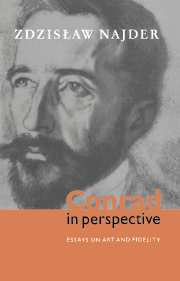Book contents
- Frontmatter
- Contents
- Acknowledgements
- Note on the texts
- List of abbreviations
- 1 Introduction, or confession of a mastodon
- 2 Conrad's Polish background, or from biography to a study of culture
- 3 Joseph Conrad's parents
- 4 Joseph Conrad and Tadeusz Bobrowski
- 5 The Sisters: a grandiose failure
- 6 Lord Jim: a Romantic tragedy of honour
- 7 The Mirror of the Sea
- 8 A Personal Record
- 9 Joseph Conrad's The Secret Agent, or the melodrama of reality
- 10 Conrad, Russia and Dostoevsky
- 11 Conrad and Rousseau: concepts of man and society
- 12 Conrad and the idea of honour
- 13 Joseph Conrad: a European writer
- 14 Joseph Conrad after a century
- 15 Joseph Conrad in his historical perspective
- 16 Fidelity and art: Joseph Conrad's cultural heritage and literary programme
- Notes
- Index
13 - Joseph Conrad: a European writer
Published online by Cambridge University Press: 07 December 2009
- Frontmatter
- Contents
- Acknowledgements
- Note on the texts
- List of abbreviations
- 1 Introduction, or confession of a mastodon
- 2 Conrad's Polish background, or from biography to a study of culture
- 3 Joseph Conrad's parents
- 4 Joseph Conrad and Tadeusz Bobrowski
- 5 The Sisters: a grandiose failure
- 6 Lord Jim: a Romantic tragedy of honour
- 7 The Mirror of the Sea
- 8 A Personal Record
- 9 Joseph Conrad's The Secret Agent, or the melodrama of reality
- 10 Conrad, Russia and Dostoevsky
- 11 Conrad and Rousseau: concepts of man and society
- 12 Conrad and the idea of honour
- 13 Joseph Conrad: a European writer
- 14 Joseph Conrad after a century
- 15 Joseph Conrad in his historical perspective
- 16 Fidelity and art: Joseph Conrad's cultural heritage and literary programme
- Notes
- Index
Summary
As the twentieth century draws to its close, Conrad's position in the front rank of its literature seems to have become (after several up and down fluctuations) unquestionable. Also, it is now generally agreed that he was an exceptional writer. Various arguments for his eminence and reasons for his exceptionality have been given (also in the present volume), and they are – and will continue to be – much discussed. Here I wish to look at an aspect of his work which until now has not attracted much attention: his Europeanism. What follows is, however, only a tentative outline of a study, which I hope will be written some day.
Joseph Conrad was a European writer in several senses of this expression, in several aspects. Let us begin by listing the most important.
1. As a writer he blended (successfully) elements of three cultures: Polish, French and English. What were these elements? What did he absorb from these cultures and make use of? In brief:
Poland: honour, fidelity and duty as essential moral values; a Romantic literary tradition – with its striking imagery and characteristic problems of moral responsibility and of the individual and his relations with society; the idea of nation as a spiritual unity; the importance of friendship. And thus, generally: elements of the imagery and basic ethical concepts and problems.
- Type
- Chapter
- Information
- Conrad in PerspectiveEssays on Art and Fidelity, pp. 165 - 175Publisher: Cambridge University PressPrint publication year: 1997



